This page is an automated translation of /nl/pacificpassage1.html and is awaiting a manual review.
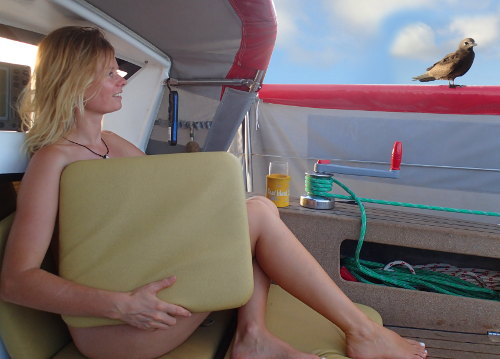
We still have a few hundred miles to go, so we're almost there! As I write this and realize that we are really almost there, I can feel the butterflies in my stomach! What have we lived here say! This part that we are now almost going to experience; arrival in the Marquises after a month at sea. In one way or another, that is what we have imagined most visually and lived towards during the entire journey. Is it because of the books we read that unanimously described the delight of THAT moment? Or is it not only because of that moment, but because of the Marquis Islands themselves, which are so beautifully described that you would want to make the entire crossing for these islands alone? With their paradisiacal green mountain walls, splashing waterfalls (1 of the highest in the world in fact), enchanting rivers and viewpoints and their extremely friendly people who excel with their beautiful singing. Or is it due to the realization that almost 4000 nautical miles is really very far with a boat of eleven and a half meters? I'm writing this on my night watch, with exactly 314 miles to go on typing this sentence. The wind tests our patience once again and almost fails, so we float towards paradise at a mere 2.9 knots. Conflicting feelings: wanting to be there and wanting to hold on to the moment of the here and now. As I type this on my night watch it is most pleasant; a sweet little bird travels with us, I think it's a storm petrel. He's exhausted and didn't protest when I picked him up and put him in a safe place. It is cloudless, the stars twinkle in the pitch-black and moonless sky and a warm breath of wind caresses my face. Detour's gentle rocking movements are pleasant and they have often been on this journey. We enjoyed it, the journey, the adventure, the excitement, the endless vista, the serene tranquility and each other.

A month is quite a long time, twelve times a month is a year. Yet our month at sea has flown by in our opinion. Would time go faster the slower you move forward? That could be, it seems that time passes very slowly for children because they have so many new impressions to process. A week at primary school took forever and class hours crept by (remember ??) ... For the elderly, on the other hand, time is getting faster, according to a brain researcher because they have to deal with far fewer new impressions. In this slow month at sea everything went well and we hardly had anything to process, our senses and brains were not stimulated to any extent, while we were not bored at all and perhaps it has flown by. It was Saturday and the next day it was already Saturday, it felt like that. We write in our logbook every day, so we know what the day is called and we think about home; what is happening there right now?
We still wear our watches. Not because we think it is so important to check what time it is or that we expect to receive a message on these smartwatches, but because they are so handy for setting an alarm. Your sense of time disappears completely on a moonless night and you want to check regularly whether everything is still going well and we will not bump into anything. Last year a boat sank on this route, it could go wrong, although it doesn't feel like it at all ... People were saved by the way, because they contacted them by radio via the daily radio.
So relaxed and rested we feel now, so stressed and tired we were before we started the journey. Well, stress may be too big a word, but it was true that everything went through our heads and we had to do a lot to get everything right. A month at sea is not nothing, then eight months in an area where almost nothing is available, internet is not a matter of course and where you have to be self-reliant, requires good preparation and involves the necessary work.
Providing
A month ago: after traversing the Panama Canal with its enormous locks, we are on the Pacific side of Panama in Flamenco La Playita for a week. It is a large anchorage where dozens of people lie who go further. Most will cross the Pacific towards the Marquises around this time (with or without a stopover in the Galapagos) and a smaller portion will spread in other directions. You cannot call the anchorage beautiful and the water is really dirty. Nobody swims next to the boat and, that is striking, everyone is busy busy busy. There is a very different atmosphere than in other places. No one is here for fun in the first place, everyone has a mission, which reads: prepare the boat for a great crossing, solve any problems, receive packages and most importantly: do some shopping! Panama is not expensive compared to the Caribbean while the Pacific is notorious for its high prices for luxury goods and booze, and cruisers just all love that cozy sundowner ... So that means you hit big and it is very funny to have all loaded dinghy's sailing back and forth. To someone watching us from the sky, we probably look like industrious ants. Only perhaps a little less organized.

Shopping goes like this: dinghy in and tear (after all, no one swims in this dirty water) to the overflowing dinghy at La Playita. The jetty is much too small in this main season. The dinghies are sometimes three or four rows deep. That means using long lines and scrambling to the side via two or three other boats. The next day, of course, you learned from this and you leave very smartly early. As a result, boarding was indeed nice and easy, but it is a hell of a job to push the other dinghies aside before you can sail away!
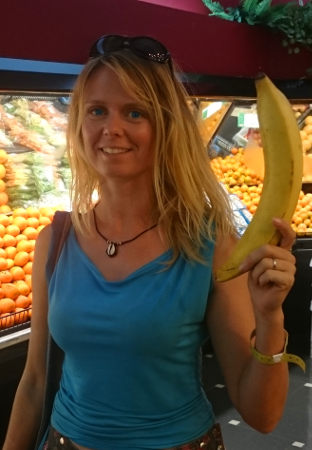
Then you walk up the bridge. If you are lucky, it is high tide and you only have to go up 5 meters. If you are unlucky (it is hot here!) Then it is low tide and more than 5 meters will be added due to the tides. When you arrive at the top on the mainland, taxi drivers will come to you. Negotiating the price (which is much higher here than in Colon) and hupsakee, finish the shops and load up. It is a time consuming activity, also because the traffic in Panama city is terrible. You come back exhausted, load the trunk full out of the taxi and quickly try to grab a wheelbarrow to transport that whole mountain of heavy groceries to the dinghy! The wheelbarrows are scarce, there are only two of them and they are immensely popular among the cruisers so everyone is doing their best to be the first, while trying to remain polite to the fellow cruiser. Appearances can be deceiving ;-) Then comes the process of loading things into the wheelbarrow, which is unfortunately far too small, but which everyone is nevertheless so happy with. That's because all cruisers buy a ridiculous share of items in glass and cans (both for eating and drinking!) And the shopping is therefore heavy.
If you were lucky on the way there, you are now out of luck and you have to descend a very steep (wide) gangway, about 10 meters down. Back and forth several times with that wheelbarrow. The sweat runs away in streams, but the result is impressive: after a lot of work, the grocery mountain has been moved to the dinghydock and the other cruiser can finally use the wheelbarrow. Then comes the process of putting the stuff in the dinghy, which is also a lot of wiggling, lugging and hassle and then you want to try to arrive dry on the boat with a dinghy that is much too heavily loaded and already on flat water. almost sinks. Once out of the shelter of the harbor, at the anchorage, it gets really exciting because boats that make high waves regularly sail there. The tactic is to steer in such a way that you go obliquely against it and then give a good dash of gas just at the right time so that the nose comes out of the water a little more. Doing something wrong means putting a layer of dirty and salt water over the nose or side of the dinghy and drowning groceries. At times like that I really feel sorry for people with a very light outboard motor and a dinghy without a hard bottom because they get a splash of water in their boat almost every time! Unloading is also a whole process in itself and becomes especially exciting when the wind is nice and hard and all boats are bucking wildly back and forth on their anchor chain, because this anchorage is not very sheltered. Handing over heavy items is quite a challenge and yes, we have occasionally dropped something. We can tell you that a six pack of beer floats happily :-D
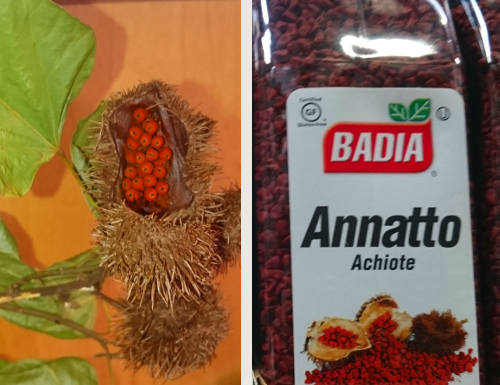
Then once the stack has been moved to the cockpit of the boat, the last step comes and that is to store everything in a small boat. What do you miss the large spacious closets at home! And to think that you never buy so much at home! It is puzzling, measuring, moving, thinking carefully where you want what, dividing weight, updating stock lists and miraculously it always succeeds - contrary to expectations - to give it a good place again. Well, we also have a lot of storage capacity on Omweg because we have a deck saloon (saloon is raised, underneath there is room for many large crates so that the space is used properly). After a lot of puzzling, sweating and red cheeks, you are done. For now. This repeats itself three times before we think we have enough, even if we end up in some paradise where we do not want to leave for a long time and where there are no shops.
When making purchases, we pay very close attention to the packaging. We will not take anything with a non-reusable and large packaging. We choose tea on its packaging, preferably no envelope and if that is not possible, a paper envelope, we leave the tea with plastic envelopes. We cannot throw plastic into the sea, that is harmful. Not only does it enter the food chain when it has become shredded small, turtles also eat it, assuming it is a jellyfish. During an autopsy of a large dead turtle, many plastic bags were found that he had eaten ... The places we visit do not have bags with 'Drenthe Plastic Waste', it is not recycled. It does not perish and it is also harmful when incinerated (cruisers burn their waste in remote places themselves by cozy camp fires so that the islands are not scooped up with their junk). Plastic is really something that we try to reduce as much as possible. Many products fall off as a result! We reuse glass jars ourselves and throw those we do not reuse into the deep sea. An animal down there is going to be very happy with its beautiful new protective hole and eventually glass turns back into the sand with which it was originally made. Tin also goes overboard in the deep sea, where an animal first goes to live in it and then it falls apart due to corrosion. Better ways are far from available in all parts of the world.
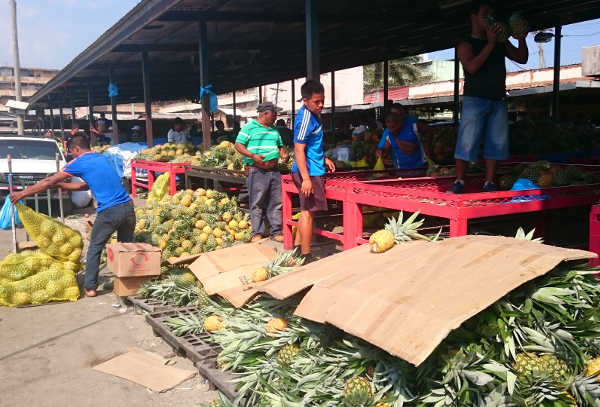
One of the times we go out with Chris, our line handler, to do some shopping. He is so sweet to want to take us with him, which is super fun and very handy because he knows what you can buy where. The 'Producemarket' is very valuable; a daily vegetable market with absurd amounts of fruit and vegetables. A cruisers paradise! WOW, it has been a long time since we have seen so many fruits and vegetables. Actually it's the first time in my life that I've seen so much. Entire streets (where cars actually drive in between) with pineapples. Streets with tomatoes, streets with oranges, streets with mangoes, streets with you name it, it is there and there is a lot. And, it is cheap! All that choice makes me feel very happy and ashamed to catch myself clapping my hands with enthusiasm. Before we went there, Chris had warned us that it is dirty, smelly and busy. That is true, but that should certainly not spoil the fun. We roam the streets and had to promise Chris we wouldn't buy right away. He is parking the car in a strategic place in the middle and will be back with us later. He says he probably gets a better price than we do. We buy a lot and bring it to the car every time it gets too heavy. The costs are really a joke. Until you realize that those people work for that. Being on the market day after day and earning a pittance. And the farmers have to work and deliver for even less. And the rest of life in Panama is not that cheap at all, neither are other groceries .... The relationship is pretty skewed and I don't intend to haggle and luckily Chris doesn't either.
Now I've managed to spend an incredible amount of characters doing something as uninteresting as running errands. Something we always do at home and which is never a big thing is now suddenly a full-day program and all in all it takes three whole days. But after this we only have to buy some fruit and vegetables for the next eight months and almost nothing else, except for some flour and the like :-)
Preparations
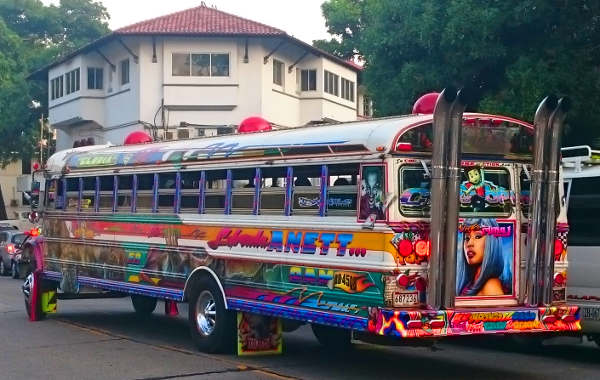
It's time to do the last chores on the boat, we make her tip top to minimize the chance of trouble along the way. We will also be writing the Panama Canal blog while we are still in Panama and we make as many payments as possible so that we will not receive reminders if we are somewhere unreachable in the Pacific. We make orders for the company, we complete the VAT return and try to think of whether we have thought of everything. Before the trip, we quickly download as much information as possible and things that still come to mind. 'Soon we will no longer have the internet!'
We are also rereading about the rules in the Galapagos and writing to various agents. We want to go to the Galapagos but the rules are not clear and the information about what the costs will be neither. There are many stories circulating at the anchorage of cruisers who are currently sitting there and who already paid a substantial amount in advance and had to pay an unexpected amount of 900 euros extra on arrival. We get a different answer from each of the 5 agents we write to! Everyone in the anchorage has different information about the Galapagos. It is really unbelievable, nobody knows what is true and what is not. It could also just be that it is different for everyone and that it depends on the agent and his 'connections'. More than half of the people we speak to sail past the Galapagos in advance and set course for the Marquises from Panama. We read that quite recently people went to the Galapagos on spec and bought the 'Autografo' on the spot, we decide to do this too and choose Isabella because according to friends this is the most beautiful island.
It is busy and chaotic in our heads and we are far from finished, but in the morning on the local radio the news comes to the ears of the local weather guru: there is a good weather hole, “go with that banana” says That! It could be the last good moment this year !!! The wind usually blows in the wrong direction here and a little further south are the doldrums, areas without wind. But now a strong wind is coming to the southwest "all the way to the Galapagos" the weather guru shouts enthusiastically. Oeffff 'just'. Nothing to worry about, see what we think of the weather ourselves (indeed seems to be good) and ehm yes well then indeed go with that banana! Not yet ready for our feelings. But to be honest, we are never ready for our feelings and we actually were afterwards. We can be very concerned about all the important things that we still want, but if we sit down for a moment and put on paper what we really want and what is actually not the priority, it appears that we can organize it and go. It does mean very little sleep the last few days; up late to do computer work.
Las Perlas
Because our line handlers Chris and Solange are really enjoying themselves and they have never been to Islas de Las Perlas before, we agree that they will sail with us there and take the ferry back. The Perlas Islands are on the route and we only have to leave 1 day later than the recommended date.

Chris and Sol join us in the evening at midnight. It was not possible before, an hour before we have completely processed the VAT returns and quickly done important things quickly. We are happy that they are there, it is a good reason to stop arranging and enjoy again and prepare for the next stage. There is no wind yet, but Chris has brought a jerry can of diesel except for a bag full of goodies and 200 (!) Oranges. Our engine uses 1 liter per hour at idle/1000 rpm and with that we go 4 knots in calm conditions, which is not bad! We motor in the leaf-still night with a quiet 1000 rpm to the Las Perlas so that we do not arrive there before daylight. Leaving the city, via a concrete and illuminated channel is 1, but arriving at an unknown place in the dark is not something we do, certainly not on the Perlas Islands with all their hard coral.
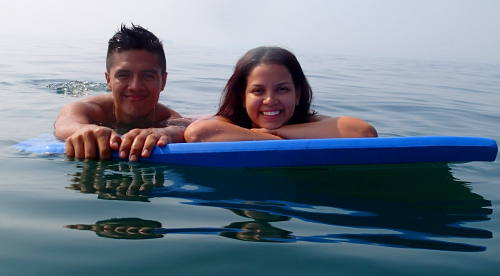
It is beautiful at night, dolphins give a spectacular light show; they pull glowing tunnels through the smooth water and tumble past the boat. By morning a semi-permeable mist forms, the water is mirror-smooth and the sun gives the whole an enchanting effect. A beautiful gift to our visit that is fascinated and enjoyed with sparkling eyes!
In the morning we snorkel at an uninhabited island. Unfortunately the clarity of the water here is quite disappointing at the moment, we don't see much. Too bad, but it shouldn't spoil the fun. Chris is determined to catch a fish, but I prepared pizza dough "just in case." If a fish is caught, we can make bread from the dough, otherwise we have a tasty pizza. The fish don't want to bite so you can guess what we eat in the evening, still with Mariska's delicious olive oil with oregano :-) Sol and Chris unfortunately leave for Panama the next day, they go home by ferry from Isla Contadora but first we have a pleasant afternoon on a beautiful secluded beach on this island. When our friends are gone it feels empty, but we don't have time to grieve; we prepare to leave early the next morning for the Galapagos. A crossing of 900 nautical miles.

Equator
We enjoy the crossing. In general it is nice sailing on a calm sea. The wind is so light that we eventually take no less than 12 days over 900 miles, which is very long, but if you do not use the engine you can often expect this on this route because there is often hardly any wind in this area. It should not spoil the fun because we like to be on the water and take the crappy day trips for granted without spoiling the serene tranquility with the engine, we only turn the engine on once when we face a headwind of a half a day. have few knots. That is too little to sail with and floating in the wrong direction is even a bit too far for us.
French, wake up! I am calling Frans because we will be crossing the equator in an hour and we still have a few things to prepare for that. One of the special moments about the crossing to the Galapagos is that you cross the equator. A sailor's belief is that you must then make a sacrifice to Neptune so that this God of the sea continues to favor you. It is a tradition to do this 'appropriately dressed'. I was already busy making a crown during Frans's afternoon nap and it is time for Frans to make something too. Frans sits with a sleepy head looking at my creation, in the meantime wondering what he will do himself, he is not very enthusiastic yet “yours is nice enough, I don't need anything”. “In addition to making a sacrifice, we are of course also going to celebrate it by drinking a glass of wine ourselves,” I say, trying to get through to the sleepy head. It works great, haha he immediately looks alert and awake and starts looking around what he can use as stuff for his creation.
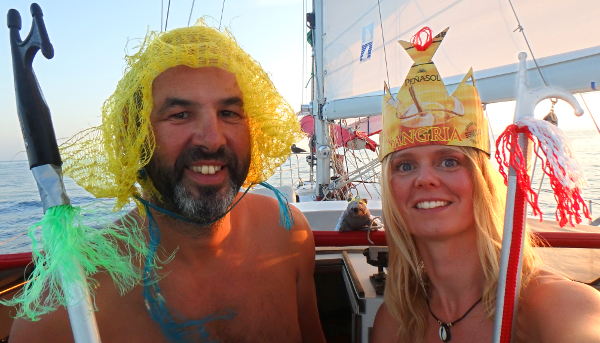
A little later the time has come; very slowly we glide over the completely flat water at a snail's pace and accompanied by a beautiful sunset and a gannet riding on the bow of Omweg, we see the latitude change from the familiar N of North to the S of South. We have crossed the equator and for the first time in our lives on the southern half of the planet !!!! WE, as nonos without sailing experience, sail here with our own boat across the equator! Momo, our guardian mouse who made Frans his daughter so sweet to us, Frans and I all make a sacrifice. For Momo the mouse this is a piece of cheese, for French a can of beer and for me a glass of Sangria. You have to do something for it! We are in a great mood and make it a big party and drink a liter of wine just like that. Oops.
Crossing the equator means that it is now suddenly no longer spring but has suddenly turned into autumn. So we're skipping summer this year, but I don't think we'll miss it. The days, which are already short here, are now getting shorter every day, because the sun goes further and further to the North every day and thus comes across to us lower and lower.
Crossing the equator also changes the rules of the weather as the Earth now turns the low and high pressure areas the other way around. And the sun rotates through the North. That is strange for us Northerners and we will often be unconsciously disoriented by this later on and very much feel that the south is 'there'. It is really strange to see the sun in the North!
Galapagos
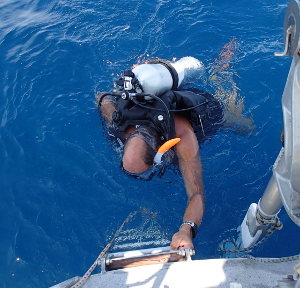
After a relaxed crossing we arrive at Isla Isabella. We've done everything agents and other cruisers advise and we arrive with an underwater hull that is spick and span. For this we scraped off the boat for a few hours on the high seas 40 miles off the coast with considerable waves with considerable waves all the growth that came on during the voyage with a putty knife. They inspect the boats with the help of divers, a 'service' for which you of course have to pay for yourself. We have also cleaned up and tidy up the inside of the boat, which is necessary for inspection, our mandatory Fumigation report is ready and all mandatory signs such as 'do not throw waste overboard' are obediently hanging in the designated places. Unfortunately it does not come to an inspection. The rules have been adjusted since this year, the agent through whom you could clear Isabella has been replaced by someone else. That someone else is nice but has nothing to say. He lets us know that we have no chance to come in like this, we are the umpteenth this year. It is best to quickly turn off our AIS and quietly sail back to San Christobal (that's 24 hours, against wind and current). We have a chance there. Oh and the costs are 1700 euros for two people and a ship with the dimensions and weight of Omweg.
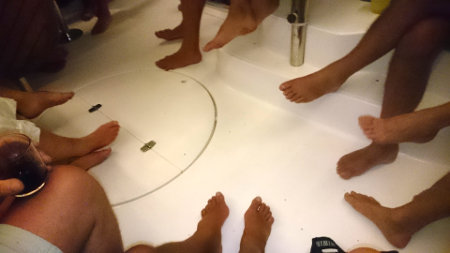
Practice 1700 euros, practice sailing back against wind and currents, practice making 'chance' instead of certainty. We decide not to and still go to the Port Captain to ask for permission. Unfortunately, this impressively uniformed man is polite but indeed says that it is not allowed and seems quite dismayed that we 'just' came ashore. We must be gone by six in the morning at the latest. I (Ilona) argue against that because we have to slalom along reefs and you don't see them clearly at six in the morning! The Port Captain is sensitive to my word 'dangerous' and we are allowed to stay until eleven o'clock and that is very special - we hear from other cruisers later on. We are brought back to Omweg under military guidance and we are forbidden to set foot on land. Shopping, getting fruit and vegetables, refueling, it's all not allowed. Fortunately, we hardly used any diesel, so we still have enough in stock. At anchorage we meet other cruisers and are invited to a party that evening on a large catamaran.
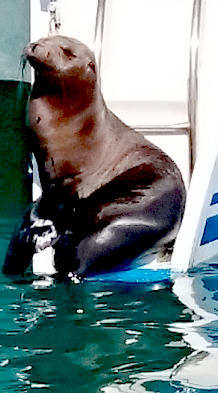
Isabella, Galapagos
We hear that people who went snorkeling from their boat were directly approached by the police that this is not allowed and that you must first hire a tour operator to be allowed to snorkel. Imagine enjoying something without paying a bed for it. The regime seems to be really absurdly strict and we hear that people who moved to the Galapagos due to a serious infection were allowed to see a doctor but had to leave immediately the next day without waiting to see if the antibiotics would work. And that in a place where you as a tourist are being plucked empty and they shamelessly ask more than a thousand euros to be allowed to come ashore. The other cruisers assure us that the authorities are now watching with binoculars to see if we are not sneaking into the water or trying to get to land. Hearing that, we decide it is time for an appropriate gesture: instead of the guest flag, we now hoist the pirate flag that we found on our boat and we just go to the party on the Canadian catamaran. We do not quite know the rules, but it seems to us that Ecuador cannot do that much against switching Dutch people to a Canadian ship without coming ashore.
The party turns out to be very pleasant and it is wonderful that we have now got to know people who will also make the big crossing. Most leave one or two days after us and we are very lucky with this. Everyone is very helpful and comes the next morning with fruit and vegetables. Very sweet and we appreciate it very much! In the meantime we enjoy our one (free) part of the day on the Galapagos. While sailing into the bay we already saw a beautiful large Manta ray gracefully lifting its wings 1 by 1 out of the water. We swim at the anchorage next to the boat with a sea lion, a shark and a large giant tortoise and while we are having breakfast on the deck, a penguin swims by! It looks like a zoo and the behavior of the authorities reminds me of the behavior of the zoo managers in the Netherlands who want to check your bag to see if you don't secretly take a sandwich with cheese because they also want to rake in some money through their overly expensive stalls . As we arrived well rested and enjoyed the crossing which has already taken almost two weeks, we do not mind to continue and in good spirits we start the crossing which is 3000 nautical miles; we set course for the Marquises.
Blog
Every day we write a message during a crossing. If you missed these, you can find them in the timeline and on the world map . I will not go into the journey in detail here, but overall we can say that it was a very nice trip. In the morning we had daily radio contact with the other boats on the way and it is fun (and useful) to keep track of the positions. There are periods with a lot of wind and periods with hardly any wind and we go swimming twice. Still a strange idea, with the miles of deep sea below you ...! Birds travel with us several times and we enjoy their presence, each other, the beautiful sunsets and sunrises, the glitter and glamor in the water, the twinkling stars and certainly also the realization that we are doing something special. Time flies and before we know it it is now and we are almost there! As I type this, we still have 34 miles to go. No land in sight yet, a rough sea and I have trouble sitting down and writing this blog, but if it is finished before we get there, you can read the story as quickly and 'real-time' as possible and we can explore the Marquises . Man, what are we looking forward to! Our calf muscles have become weak bags, we have to walk, climbing and scrambling to explore the wild nature!
Sailing on the Pacific
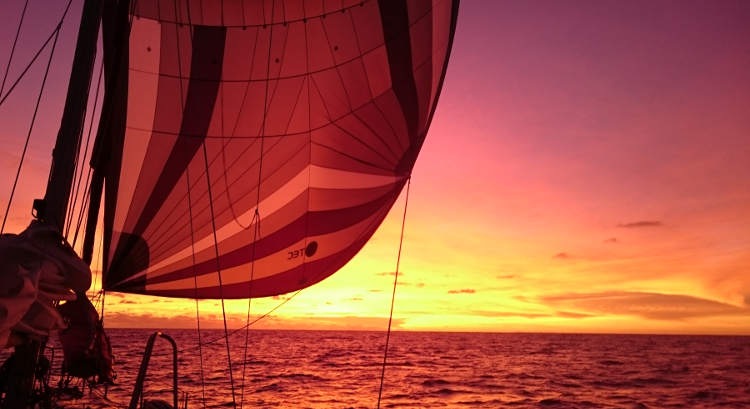
In our case, the Pacific lived up to its name: serene tranquility reigned over the water all the time. The weather conditions were extremely predictable; we faithfully picked up a fresh grib file every day, but from the Galapagos we might as well use a copy from a week ago. Every day, all wind vanes from East-South-East, thousands of miles long, with almost always between 10 to 15 knots of wind. A very calm sea, varying from flat water to a calm sea swell with an enormous distance between the wave peaks of sometimes a hundred meters or more. Very slowly we were overtaken by a wave and then rose very slowly and imperceptibly upwards, and then slowly slid down again on the other side. During the night we unfortunately had to deal with squalls, which are tropical rain showers that occur very quickly and only last a short time, but can contain a lot of wind. The squalls that we experienced were usually very benign, but the result of this was that we sailed at night with a very conservative and therefore slow sailing method. We often sailed with the Parasailor during the day and on the furling genoa at night. We often found the weather on the Atlantic somewhat threatening because it can change just like that, the sea in the Caribbean is extremely uncomfortable with relatively strong winds and steep waves. But here on the Pacific it's different and for the first time we really enjoy a crossing. There was hardly any traffic; we once saw a cargo ship pass by but we heard from other boats that they once encountered a Japanese fishing factory. You can no longer call such a fishing boat, because there is a net that is 20 kilometers long and there are a helicopter and three drones flying in the air to lure the fish to the net with bright lights. We no longer call this fishing, but the shameless robbing of the sea with a complete lack of respect for dolphins, sea birds and everything that is killed as "bycatch" as a result. Everyone who witnesses it is upset about it.

Fishing
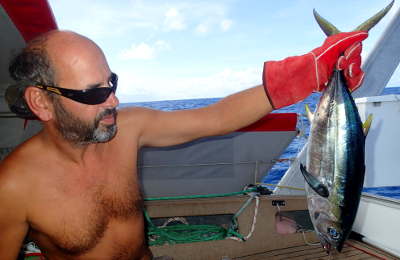
We fish too. But different. We drag a plastic octopus behind the boat and use it to attract predatory fish such as tuna. In the middle of the ocean there is no vegetation and practically everything that swims around eats other fish and is later eaten by an even larger fish itself. We are now part of this system and Ilona, who normally eats vegetarian, is also participating in the fish. It is ecological: not a drop of diesel has been used for this food and no packaging material is wasted and, moreover, the fish had a good natural life and there is no 'unwanted by-catch' going to waste. Our fishery is successful and we regularly pull a tuna out of the water which we then treat to a drink after which the animal immediately ends up in an eternal intoxication. We eat tuna salad for lunch, fillet of tuna with dinner, and tuna as a snack in between. We also want to try a different fish, but somehow we only catch tuna. This to the jealousy of some other boats that have been towing a line behind the boat for thousands of miles but never caught anything.
Repairs
The focus during this crossing is even more than usual on keeping your belongings intact. There are no repair facilities along the way, warranties are useless, something that breaks is a problem anyway. We sail conservatively and lose some speed because of this, but later we hear from the faster boats that they have blown up some sails, lines have been cut, etc. and they waste a lot of time waiting for the broken items to be repaired or newly flown in and cleared.
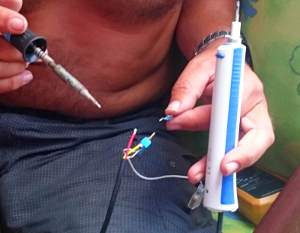
The charger of our electric toothbrush breaks. This is not the first time: Braun's junk cannot handle slightly deviating waveforms, so our inverter that turns the 12 Volt battery voltage into 220 Volt is not good enough for Braun. Ok, the bread maker, kettle, microwave, etc. all work fine on the inverter but not the toothbrush charger. We also have a small sine wave inverter but unfortunately that sine wave inverter has now passed away so we can no longer charge the toothbrush. In Panama everything works on 110 volts (but Braun chargers, unlike modern chargers, cannot handle an international voltage), they hardly know electric toothbrushes and we could not find sine wave inverters at all. So then switch to brushing his teeth by hand, but Frans soon develops an inflammation of his gums and an inflamed tooth root threatens, which is no fun if the dentist is not available for weeks. The cordless rechargeable toothbrush is therefore transformed by him into a toothbrush with cord that can be recharged via a USB plug and the danger seems to have passed.
The MPPT controller of our solar panels appears to cause serious interference on the shortwave. A toroid core is demolished from the defective sine wave inverter and rewound becomes a good interference suppression filter for the MPPT controller. We therefore also do recycling in this area!
Radio

The following is solid food for psychologists and sociologists. But the radio took on a special meaning for us. You sail with only water around you for a month, every day. Below your blue, above your blue. Halfway you are 2700Km from the nearest coast and the bottom is all that time about 3000m below you. Phew, a long swim if you want to go to the mainland. Days fade, distance fades. Even the trusted guidance that you know from home, the time, is no longer a grip here because we regularly move the time and we have to deal with the time at home in the Netherlands, then UTC again, the time at the place of arrival, the time at the place of departure, and the time we spend on the boat. At home it is no longer "a few hours later" but late in the evening when the sun rises here. And home is a strange concept when no other people seem to exist anymore. We do not see any sign of other people for weeks, even the smartphones remain silent. And then suddenly there is that little something to hold on to in that sea of emptiness: the radio. Every morning at 1600 UTC a flock of boats on their way from the Galapagos to the Marquises gather on 8,143MHz USB with an accompanying "net controller". We got to know some of the participants briefly during our party evening on the Galapagos, while others were unknown to us. But everyone registers faithfully and goes down the list every day: latitude, longitude, course over ground, speed over ground, weather conditions and conclude with the reassuring "all is well on board". This communication usually takes some doing because the distances are great, the shortwave propagation is erratic and not every boat can hear every other boat, so a "relay" is often requested. We often act as relay because we have a metal boat and that is a clear advantage for shortwave communication: Ilona's voice reaches thousands of miles away. Every day we diligently note the positions of all nearly 30 participating boats and we program the closer ones in our chartplotter (kind of TomTom) so that we can follow them properly. Close by is a relative concept, because boats that are "only" 300 kilometers away from us belong to the category "nearby". We can dream every voice after a short time and we unintentionally fantasize about a character of people who are not yet known to us. Origin doesn't matter at all and the only similarities are the fact that we are cruisers and that we speak the English language. Our net consists of Scots, Americans, New Zealanders, Australians, Swiss, English, Austrians and Canadians. The need for human contact appears to be great and after some time a quiz is even held over the radio, which becomes so popular that we even have a daily quiz at the end. Musicians travel on some boats and en route the "banana balad", a hilarious song created by Jane and David of the Eliana that scoffs the prominent survival food and participating boats.
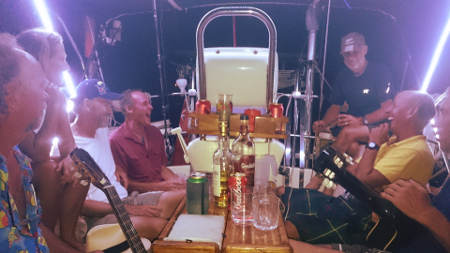
Our original plan was to go to Fatu Hiva, but there is a rumor about problems arriving to this island that is not an official port of entry, and in fact we feel we cannot just disappear quietly from our small floating community who has been so dear to us for a month. So we go to Hiva-Oa where the others also go. Two days before arrival we see boats again on our AIS for the first time: all lines are slowly coming together again. At night we see the top light in the mast of some boats and we can suddenly talk via the VHF again. We signal each other with flashlights because it is suddenly very special to see the evidence of another human being instead of an endless horizon. The arrival is great! We can smell the land from afar and we recognize a number of boats that we have heard on the radio. Look, there is Time Bandit, hey, that's Philiosophy, oh so that's Villemee, etc. A few days after us the Austrian Esperanza comes in and triumphantly holds up a huge Wahoo which we will all eat later that day on board of a Scot who has put on his Scottish skirt for the occasion and treats us lavishly with Scottish whiskey. For days on end, we are absorbed in a social program where inviting and being invited is central. We are congratulated and congratulated after our incoming acquaintances and in the evening we party on the bigger boats. That goes so far that only after two days at the anchorage we finally get around to going ashore for the first time ....!
We write another piece about coming ashore, but we can already say that nature and the local population are absolutely wonderful!